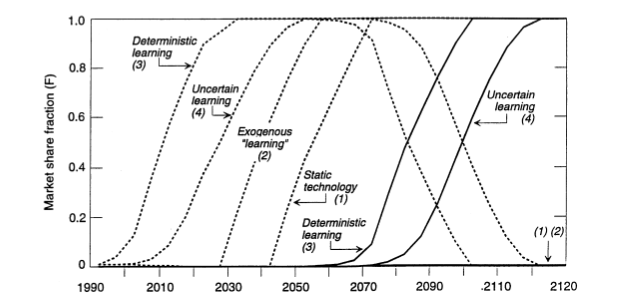Is #ClimatePolicy costly? In the article below, I argue that instead of this question, what we should be asking is how a low-carbon future compares to maintaining course.
Answering the latter question reveals that the #ClimateCrisis is our wake-up call. 1/18 https://twitter.com/EmilDimanchev/status/1314516951146823681">https://twitter.com/EmilDiman...
Answering the latter question reveals that the #ClimateCrisis is our wake-up call. 1/18 https://twitter.com/EmilDimanchev/status/1314516951146823681">https://twitter.com/EmilDiman...
The two questions above exemplify two very different mental models of climate change, which influence not just our daily conversations, but also how we analyze our policy decisions in both academic and policy making contexts. 2/18
The traditional way to see climate change is as an isolated problem. This is the framing of Economics 101: climate change is an externality in an otherwise optimally functioning system. 3/18
From this perspective, climate policy is costly, *by definition*, since it takes the economy out of the previous perfect equilibrium. Consumers face higher prices and consume less than they otherwise would, results that occur, again, because of how we defined the problem. 4/18
This is how climate policy is often modeled. Simulate the economy in a state of perfect equilibrium and call that “Business as Usual”. Add a constraint on GHGs. Call that “Climate Policy”. Look at how model output differs b/n the two and that& #39;s the effect of climate policy. 5/18
This also how we frame climate change as a tragedy of the commons. Solving it is seen as requiring that individual actors - citizens or whole countries - sacrifice for the common good. The optimal individual decision is seen to be to free ride on efforts by others. 6/18
The framing can also be seen in how current debates are often preoccupied with how much climate policy will cost and who will pay. Consider the debates over the #GreenNewDeal or the US’ justification for withdrawing from the Paris Agreement (to which I refer in the piece). 7/18
The unifying assumption here is that the status quo is optimal (except for the climate side-effect).
But is it? Are the practices that have led to this moment ones we would actually want to continue? 8/18
But is it? Are the practices that have led to this moment ones we would actually want to continue? 8/18
Multiple strands of evidence suggest that, no, the status quo is not all that special. Changing course and decarbonizing is preferable with or without climate change.
It turns out then that the #ClimateCrisis is better seen as a societal wake-up call. 9/18
It turns out then that the #ClimateCrisis is better seen as a societal wake-up call. 9/18
The wake-up call perspective starts to make sense when we consider societal evolution through the lens of technological progress, which shows fossil fuels owe their prominence to a large degree to path dependence. They remain locked in despite superior alternatives. 10/18
When we consider all the harmful consequences, from deadly air pollution to energy insecurity and centralization of power in authoritarian regimes, fossil fuels start to seem like a bad habit we should have shaken but have for too long procrastinated on. 11/18
In this context, the #ClimateCrisis is an opportunity to adopt needed change, to re-direct and plot a course to a better future with more innovation, greater efficiency, better human health, thriving cities, and flourishing forests providing bountiful ecosystem services. 12/18
This wake-up call theory of climate change shows that nations have much to gain from being early movers. It suggests individual actors face very different incentives from those of the tragedy of the commons (yes I am ignoring repeated prisoner’s dilemma games here). 13/18
That is why the way we frame climate change matters. Seeing it as a problem can encourage delay. Seeing it as an opportunity shows we have many reasons to seize the moment and be optimistic about a low-carbon future. 14/18
But it also informs how academics and analysts model climate policy in their roles as decision advisors.
How would our conclusions differ if our models started not from a “first-best” status quo but captured the many ways in which the BAU is imperfect? 15/18
How would our conclusions differ if our models started not from a “first-best” status quo but captured the many ways in which the BAU is imperfect? 15/18
A simple example comes from my own research on air pollution. As I and others have found, if we factor air pollution in the BAU, transitioning to renewables makes sense with or without climate change (references in the article). 16/18
In my PhD I am researching dynamics of energy transitions, where modeling that captures path dependence effects shows clean energy deployment is optimal at an earlier stage than if such effects are ignored. Figure from this paper: http://www.sciencedirect.com/science/article/pii/S0301-4215(98)00067-6">https://www.sciencedirect.com/science/a... 17/18
I don’t have the answers and I’d be curious to hear from others. Tagging below a few folks I’ve seen grapple w/ these issues & that anyone reading this should check out. Here is the article again, which is more cohesive & referenced than this thread. 18/18 https://medium.com/@EmilDimanchev/a-wake-up-call-theory-of-climate-change-fc5d3077a22b">https://medium.com/@EmilDima...
Coincidentally enough the ever insightful @Peters_Glen made a similar point this morning: https://twitter.com/Peters_Glen/status/1315555077235585024?s=20">https://twitter.com/Peters_Gl...
. @MarkVinPaul has been making similar points about the benefits of climate policy, including in his work on the Green New Deal, which I couldn& #39;t get to in the piece but thought is worth bringing up here. https://rooseveltinstitute.org/publications/decarbonizing-us-economy-toward-a-green-new-deal/">https://rooseveltinstitute.org/publicati...
. @kelleher_, @noahqk, and @GernotWagner have been providing a lot of insight here for years about modeling climate policy and the assumptions on which modeling practices are premised. I am very curious what they would say.

 Read on Twitter
Read on Twitter


